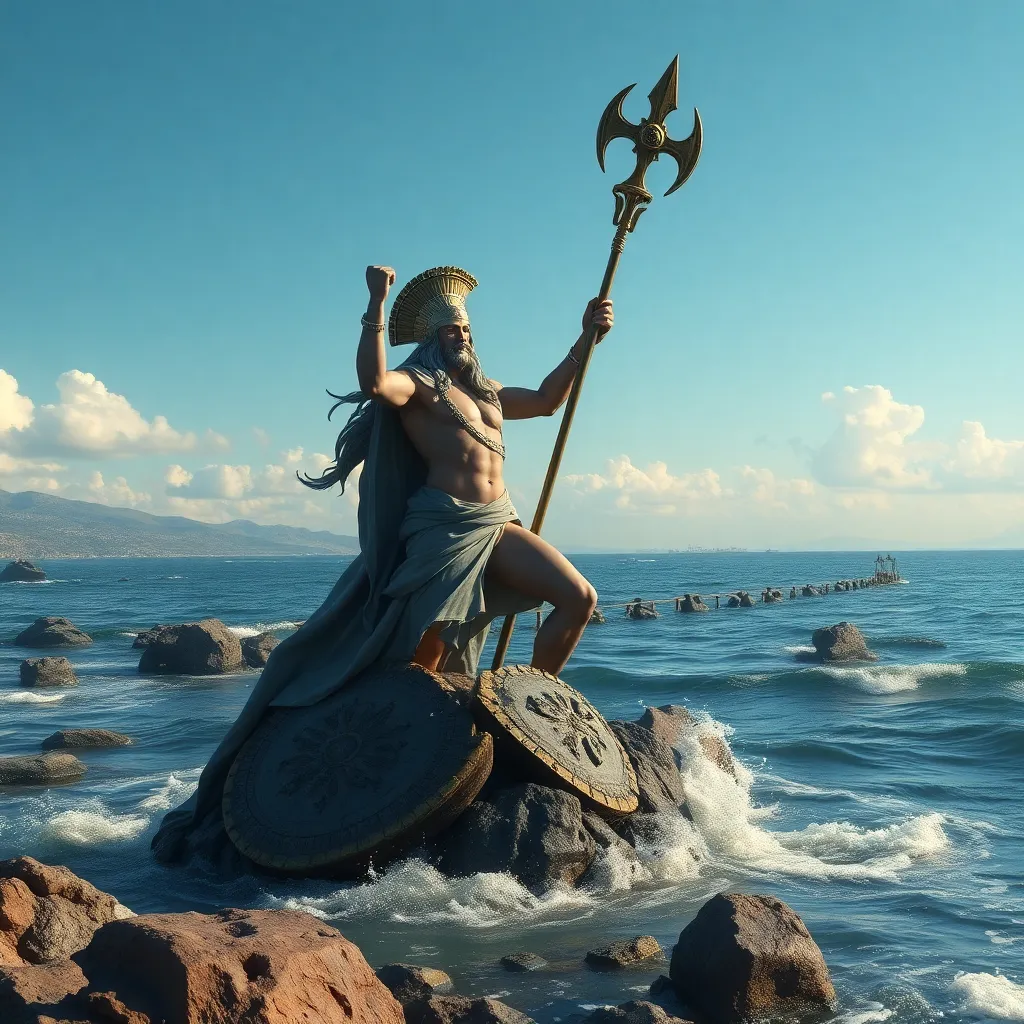Poseidon’s Role in the Trojan War: A Deeper Look
I. Introduction
The Trojan War, a significant event in ancient Greek mythology, has fascinated scholars and enthusiasts for centuries. This legendary conflict, primarily chronicled in Homer’s epics, showcases not only the valor of heroes but also the immense influence of deities in the lives of mortals. Among these gods, Poseidon, the god of the sea, played a crucial role in shaping the events of the war.
In ancient Greece, the gods were believed to take an active part in human affairs, often swaying the outcomes of battles and influencing the fates of individuals. Poseidon, with his dominion over the oceans, storms, and earthquakes, emerged as a key figure in the Trojan War, affecting both the Greek forces and their enemies.
II. The Mythological Context of Poseidon
Poseidon, one of the twelve Olympian gods, is known for his robust personality and formidable powers. He is often depicted with a trident, a three-pronged spear that symbolizes his control over the sea. Poseidon is the brother of Zeus and Hades, and like them, he possesses immense power and authority.
Among the Olympian gods, Poseidon holds a unique position:
- God of the Sea: Poseidon governs all bodies of water, influencing both their calmness and ferocity.
- Earthquakes: He is also known as the “Earth-Shaker,” capable of causing tremors and devastation on land.
- Horses: In addition to his aquatic dominion, Poseidon is associated with horses and is credited with their creation.
His relationships with other gods and mortals are complex. Poseidon has a contentious relationship with Athena, the goddess of wisdom and warfare, often leading to rivalry and conflict that would echo throughout the war.
III. Poseidon’s Initial Support for the Greeks
Initially, Poseidon aligned himself with the Greek forces in the Trojan War. Several factors contributed to his allegiance:
- Anger at the Trojans: The Trojans had insulted Poseidon, leading to his desire to see them defeated.
- Support for Agamemnon: As the leader of the Greek forces, Agamemnon sought Poseidon’s favor, further securing the god’s support.
Key events illustrate Poseidon’s support for the Greeks:
- He assisted in the construction of the Greek fleet, providing the necessary resources and guidance.
- During battles, Poseidon often sent favorable winds to aid the Greek ships, allowing them to navigate the Aegean Sea effectively.
IV. The Divine Quarrel: Poseidon vs. Athena
The relationship between Poseidon and Athena was marked by rivalry, particularly over the fate of Troy. Both deities sought to influence the outcome of the war, but their methods and motivations often clashed.
The implications of this divine conflict were significant:
- Poseidon’s support for the Greeks conflicted with Athena’s favor towards Odysseus and the cunning strategy of the Achaeans.
- The rivalry influenced key battles, with each god intervening to aid their favored side.
Notable incidents that illustrate this tension include:
- The construction of the walls of Troy, where Poseidon was initially involved but later withdrew his support due to Athena’s involvement.
- The contest for the city of Athens, where Poseidon offered a saltwater spring, while Athena presented the olive tree, leading to her victory and further animosity.
V. Poseidon’s Influence Over the Sea and Natural Elements
As the god of the sea, Poseidon’s control over water and weather significantly impacted naval warfare during the Trojan War. His powers manifested in various ways:
- Naval Warfare: Poseidon’s favor was crucial for the Greek fleet, ensuring safe passage and effective maneuvers.
- Storms and Monsters: Poseidon could conjure storms and unleash sea monsters to thwart enemy ships, demonstrating his divine intervention.
- Earthquakes: His ability to cause earthquakes added a layer of unpredictability to the conflict, affecting battle strategies.
These elements of Poseidon’s influence were pivotal in shaping the course of the war, illustrating the belief that the gods actively participated in the fate of humanity.
VI. Key Battles and Events Involving Poseidon
Throughout the Trojan War, several battles showcased Poseidon’s crucial role:
- The Battle of the Ships: Poseidon intervened to protect the Greek fleet from a Trojan assault, demonstrating his commitment to their cause.
- The Fall of Troy: In the final stages of the war, Poseidon’s support was instrumental in breaching the walls of Troy, a task that combined both cunning and brute force.
Analysis of Poseidon’s interventions reveals a pattern of strategic actions that often shifted the tides of battle in favor of the Greeks. His divine powers amplified their strengths and mitigated their weaknesses, ensuring that both the sea and land were under his watchful eye.
VII. The Aftermath of the War and Poseidon’s Legacy
In the aftermath of the Trojan War, Poseidon’s role continued to resonate within Greek mythology:
- Rebuilding and Retaliation: Poseidon played a role in the rebuilding of cities and the punishment of those who defied the gods.
- Long-term Effects: His interventions during the war established him as a powerful figure who could sway the outcomes of human affairs.
- Cultural Perception: Later narratives depicted Poseidon as a complex character, embodying both benevolence and wrath.
His legacy endured, influencing countless tales and establishing him as a central figure in the pantheon of Greek deities.
VIII. Conclusion
In summary, Poseidon’s contributions to the Trojan War were profound and multifaceted. His initial support for the Greeks, divine rivalries, and control over natural elements highlight the significant role that deities played in ancient Greek warfare.
Reflection on Poseidon’s influence illustrates the belief that divine intervention was a critical factor in determining human fate. The enduring legacy of Poseidon in mythology and literature serves as a testament to his importance in Greek culture, reminding us of the powerful interplay between the divine and mortal realms.




